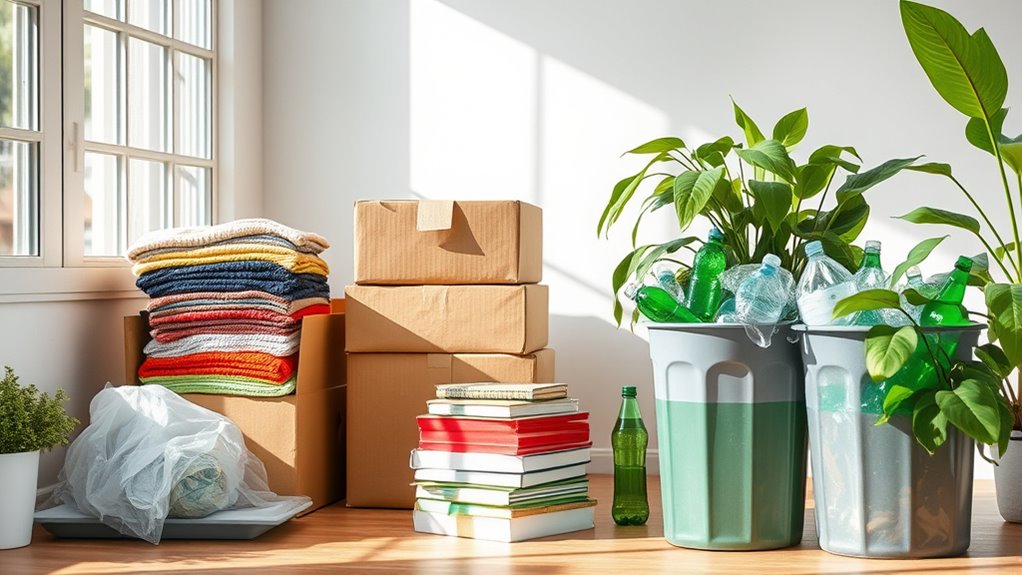To declutter the green way, focus on donating and recycling your unused items. Sort your belongings into categories like keep, donate, recycle, or discard, and find local charities or recycling centers for responsible disposal. Use eco-friendly storage solutions to prevent clutter buildup and support community recycling initiatives. Properly maintaining your items can extend their lifespan. Keep these eco-conscious habits in mind, and you’ll discover more ways to make your decluttering efforts even more sustainable.
Key Takeaways
- Prioritize donating usable items to local charities, shelters, or community centers to extend their lifespan and reduce waste.
- Recycle electronics, plastics, and metals through certified programs to ensure responsible material processing.
- Use eco-friendly disposal methods, such as biodegradable bags and composting organic waste, to minimize environmental impact.
- Choose sustainable storage solutions like bamboo baskets or recycled plastic bins to organize and prevent future clutter.
- Regularly assess belongings for safety and usability, supporting eco-conscious habits that reduce unnecessary disposal.

Ever wondered how to clear your space while also protecting the environment? The key lies in embracing eco-friendly storage solutions and committing to sustainable disposal methods. When you declutter, it’s not just about tidying up; it’s an opportunity to make conscious choices that benefit the planet. Instead of tossing everything into the trash, consider how you can repurpose, donate, or recycle items responsibly. This approach helps reduce waste and keeps usable goods out of landfills, aligning your decluttering efforts with eco-friendly principles.
Start by sorting your belongings into categories: keep, donate, recycle, and discard. For the items you decide to donate, look for local charities, shelters, or community centers that accept clothing, furniture, and household goods. Donating is an excellent way to give items a second life and support those in need. When it comes to recycling, check if your local recycling programs accept items like electronics, plastics, or metals. Many communities now have specialized recycling centers that handle these materials safely, ensuring they’re processed sustainably and don’t end up polluting the environment. Regularly inspecting your belongings for safety features, such as auto shut-off on electronics or heated products, can prevent accidents and extend the usability of your items, reducing unnecessary waste.
Sort items into keep, donate, recycle, or discard to support sustainability and community well-being.
To make your decluttering process even more eco-friendly, invest in sustainable disposal options. Use biodegradable trash bags or containers that can break down naturally, reducing plastic waste. If you’re discarding items that can’t be recycled or donated, consider composting organic waste or finding specialized disposal services for hazardous materials like batteries or chemicals. This way, you’re minimizing your ecological footprint and supporting a healthier planet. Additionally, properly cleaning and maintaining your items—such as lubricating hinges or sealing leaks—can prolong their lifespan and prevent premature disposal, further reducing waste. Incorporating eco-friendly storage is also essential. Instead of cluttering your space with cheap, disposable containers, opt for durable, sustainable storage solutions. Think bamboo baskets, recycled plastic bins, or wooden crates made from responsibly sourced materials. These options not only look better but also last longer, reducing the need for frequent replacements. Properly organizing your belongings in eco-friendly storage units makes it easier to maintain a clutter-free environment and encourages ongoing sustainable habits. Remember, adopting recycling programs tailored for specific materials can significantly enhance your waste management efforts and reduce environmental impact. Additionally, awareness of narcissistic behavior can help prevent emotional burnout during your decluttering journey, especially if family members or cohabitants exhibit controlling tendencies.
Frequently Asked Questions
How Do I Determine Which Items Are Recyclable Versus Donation-Worthy?
When deciding which items are recyclable versus donation-worthy, start with sorting criteria and item evaluation. Ask yourself if the item is in good condition and useful to someone else; if so, it’s donation-worthy. If it’s damaged or can’t be reused, then it’s likely recyclable. Check local recycling guidelines for materials like paper, plastic, and metal. By carefully evaluating each item, you ensure they go to the right place and reduce waste effectively.
Are There Specific Charities That Accept All Types of Household Items?
You might wonder if any charity organizations accept all types of household items. While some charities, like thrift stores, accept a wide range, most prefer specific donations. Recycling centers focus on certain materials like metal, plastic, or paper. To guarantee your items go to the right place, check with local recycling centers and charity organizations to see their accepted items list. This way, you support eco-friendly disposal and charitable giving effectively.
What Are the Best Ways to Prepare Items for Donation or Recycling?
When preparing items for donation or recycling, you should clean and repair them to guarantee they’re in good condition. Use upcycling techniques to creatively repurpose items, reducing waste. For donation drop off tips, pack items securely and organize them by category. Remove any tags or labels, and follow any specific guidelines from the charity. These steps help your items find new life while making the process smoother for everyone involved.
How Can I Ensure My Donated Items Are Used Responsibly?
To guarantee your donated items are used responsibly, you should choose charities committed to sustainable disposal and ethical donation practices. Research organizations to confirm they properly distribute or recycle items, avoiding waste. Clearly communicate your expectations and ask how your donations will be used. By doing this, you support responsible reuse, reduce waste, and promote environmental sustainability through ethical donation practices.
What Local Regulations Should I Be Aware of When Recycling or Donating?
Imagine a roadmap guiding your eco-friendly journey—your local regulations and recycling guidelines are just that. You need to be aware of specific rules in your area, like what items are accepted and how to prepare them properly. Check your city’s waste management website or contact local authorities. Staying informed guarantees your recycling efforts are responsible, legal, and truly green, turning your decluttering into a positive environmental act.
Conclusion
So, as you clear out your clutter the eco-friendly way, remember—your trash might just be someone else’s treasure. Ironically, by recycling and donating, you’re giving your unwanted items new life, saving the planet one box at a time. Who knew decluttering could be so green and generous? So go ahead, toss out the old, but make sure it’s for a good cause—you’ll feel lighter and greener, all at once!









